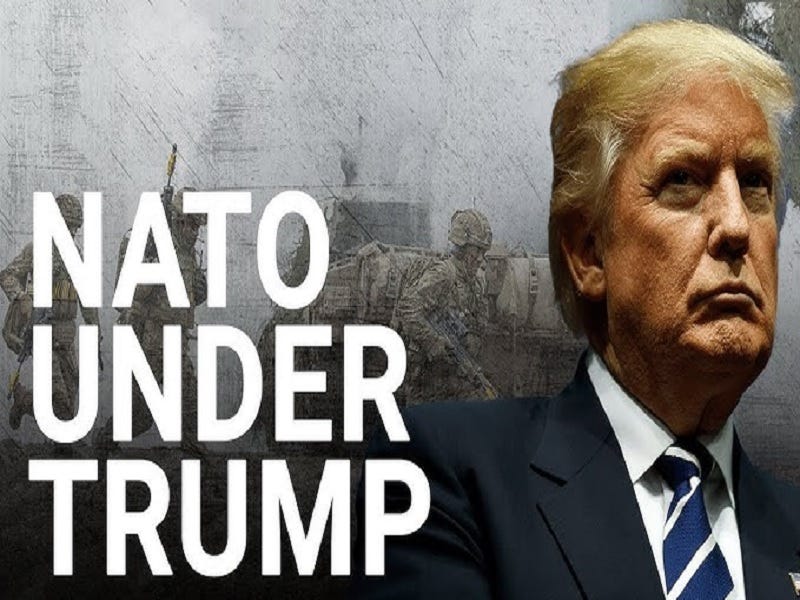All that he wanted to do was make a rhetorical point to whichever leader it was that he spoke to about this sometime in the past and hype up his base ahead of the vote to ensure maximum turnout.
Trump caught a lot of flak from the Mainstream Media and Western officials for his latest comments about NATO. He related at a rally how he told an unnamed NATO leader that “you didn’t pay, you’re delinquent… No, I would not protect you. In fact, I would encourage them (Russia) to do whatever the hell they want. You got to pay your bills.” Biden, NATO chief Stoltenberg, and others erupted in fury, but what the former president said was actually quite sensible.
NATO countries agree to contribute 2% of their GDP to defense, but most of them still don’t, which results in the US having to bear an ever greater financial and material burden for their security. About that, it was always unrealistic to imagine that Russia would risk World War III by invading NATO due to the US’ nuclear umbrella over it, but many Central & Eastern European (CEE) countries are still paranoid about this. They pay above that threshold, but their Western European counterparts and Canada don’t.
Therein lies the problem since those countries still formally extend credence to their CEE peers’ paranoid fears, yet they don’t want to partially allay them by contributing the previously agreed-upon share of their GDP to defense, thus raising “politically uncomfortable” questions about their commitments. This is unacceptable from Trump’s perspective since those countries have greater GDPs and can therefore contribute more meaningfully to the bloc’s shared goals than the CEE states can.
By refusing to allocate their budget accordingly despite going along with NATO’s anti-Russian narratives and being the ones who’d bear the brunt in any conflict no matter how far-fetched that scenario is, they’re basically manipulating the US into doing more on their behalf. Either they don’t believe that Russia requires these extra resources to be contained, in which case they should just say so but likely won’t due to pressure, or they do believe it but don’t want to pay their fair share for some reason.
Whatever the truth may be, it discredits NATO from the perspective of the US’ hegemonic interests and therefore facilitates efforts by civil society activists and foreign state actors to sow the seeds of division between its members. Preexisting differences have already widened in some ways throughout the course of the Ukrainian Conflict over the past two years, but they can be further exacerbated by the aforementioned players the longer that Western European countries and Canada refuse to pay up.
To be sure, the US’ military budget is larger than all other NATO members’ combined so it wouldn’t make much of a substantive difference even if every one of them contributed 2% of their GDP to defense, but the point is that it’s disrespectful to America to decline doing so upon its repeated requests. The US extends its nuclear umbrella over them for self-interested strategic reasons, but average Americans don’t understand why since it’s rarely articulated and thus assume that it’s for naïve charitable purposes.
Even if they were compellingly told why, many might not agree with the cynical and hegemonic-driven reasons, even less so if they knew that not all NATO countries were paying their fair share that they agreed upon by joining and are therefore leaving the US to pick up the slack via their taxes. This makes the issue a sensitive one in terms of domestic politics and serves as a bridge between it and International Relations during presidential election seasons if candidates choose to bring it up like Trump just did.
He said what he did in order to make a powerful political point that he expected would resonate with his conservative-nationalist base, not to signal to Russia that he’ll stand aside and let it steamroll through NATO. The US has its own reasons to prevent that from happening even if Western Europe and Canada don’t pay up, plus elite members of the country’s military, intelligence, and diplomatic bureaucracies (“deep state”) could simply defy his orders in that far-fetched scenario to unilaterally try to stop it.
It's therefore unrealistic to imagine that Trump’s possible return to power during this November’s elections might lead to the Russian conquest of Europe with his approval. All that he wanted to do was make a rhetorical point to whichever leader it was that he spoke to about this sometime in the past and hype up his base ahead of the vote to ensure maximum turnout. Trump’s comments were therefore sensible, not insane or irresponsible like they were misportrayed, and will resonate at home and in CEE.





For the sake of world peace we need Trump back in the White House in place of the current turnip.